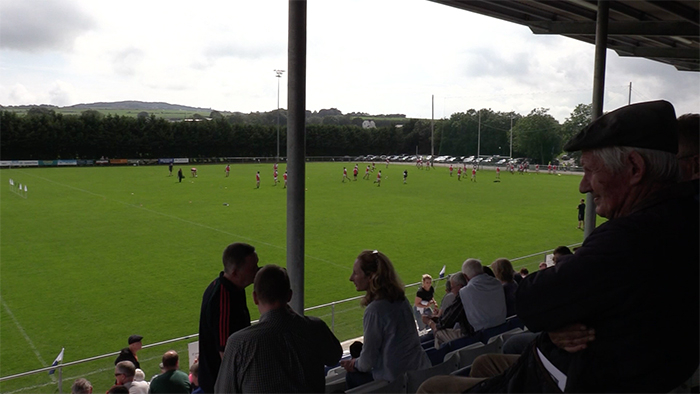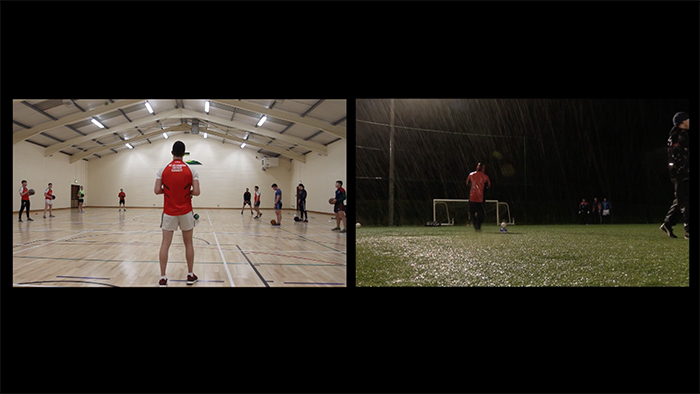Practice-led research
Practice-led PhD in Film and Screen Media, University College Cork. Funded by the Irish Research Council Postgraduate Scholarship Programme. Supervised by Professor Laura Rascaroli.
https://www.ucc.ie/en/fmt/film/research/graduatestudents/#michael-holly
Since early 2019 I have been following various activities at a Gaelic Athletic Association (GAA) club in West Cork, Ireland. The GAA is the most ubiquitous cultural and sporting organisation in Ireland, with a prominent presence in almost every community. Though sports in the form of Gaelic Football, Hurling and Handball are the main focus of these community organisations, local GAA clubs are often the social and cultural centres of Irish communities.
My project's methodology uses an an experimental form of visual ethnography as a starting point. Using portable video and sound equipment, I continue to document various activities around the GAA club and its members, including games, training, fundraising activities, social gatherings, even funerals and church services. This documenting is mainly observational. At intervals throughout the project I am holding 'interviews' with certain members of the club's sporting and organisational structure. These 'interviews' also serve as feedback sessions, where the members watch footage I have collected and offer me their opinions on how they feel they have been represented. More elaborate group- feedback sessions are also being planned for late 2021.
The resulting material is being assembled to become a video installation at nearby Uillinn, West Cork Arts Centre in April 2022:
Ethical Practice
The problem of ethical practice in documentary has prompted various experiments in subject participation and methodologies. My practice-based research's central concern is to be able to form a representation of the GAA community that I am working with, with feedback and participation from the club members in order to form a sense of the group that is ethically sound. In order to do this I am researching various documentary and participatory art practices that have attempted to divert complete authorial control away from the artist or filmmaker in similar situations. This research is ongoing, and is outlined on another section of this website: Seeing Documentary as Participatory Art

Project abstract
The practice of making documentary films is often fraught with ethical complications. A filmmaker is responsible for how the members of the group are represented, and decisions on film style, editing and screening can easily have a negative impact on people's lives. In response to these problems, my project will collaboratively develop a system of collecting and showing sensory information using video images and sound, that can become a new way of knowing and understanding a community, while providing the community with a new way of knowing and understanding themselves.
My method, which I call 'Performative Feedback Filmmaking', is developing a unique, creative, socially-engaged form of nonfiction filmmaking by drawing from a combination of specific disciplines and techniques, including participatory art, ethnographic filmmaking, sensory ethnography, and video installation. The subjects of my creative film project are also participants, whose input is vital to the development of the methodology and the final creative work. The focus is a rural Gaelic Athletic Association (GAA) club in Co. Cork. Over three years, I am attending the club as a volunteer member and filmmaker, recording club activities. The participating club members have regular opportunities to view the footage as video installations in the club building. They contribute their own footage to the project, and feedback collected through semi-structured interviews, informal interviews and focus groups shapes the development of the creative work. This project will introduce a new, holistic approach to participatory documentary filmmaking, stepping away from the traditional narrative structure of cinema, and embracing new technologies and alternative screening methods.

Video Installation
The use of video installation as opposed to conventional narrative film structure is a key component of my method. Video installation of documentary material offers possibilities for subjective readings of material that is important to an ethical representation of the group of people I am working with. A chapter of my dissertation deals directly with this theory, and is outlined in another section of this website: The politics of engagement and spectatorship of the installation space
